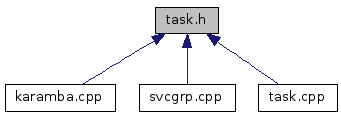superkaramba
#include <Python.h>

Go to the source code of this file.
Functions | |
| PyObject * | py_get_startup_info (PyObject *self, PyObject *args) |
| PyObject * | py_get_startup_list (PyObject *self, PyObject *args) |
| PyObject * | py_get_task_info (PyObject *self, PyObject *args) |
| PyObject * | py_get_task_list (PyObject *self, PyObject *args) |
| PyObject * | py_get_task_names (PyObject *self, PyObject *args) |
| PyObject * | py_perform_task_action (PyObject *self, PyObject *args) |
Function Documentation
Task/getStartupInfo.
SYNOPSIS list getStartupInfo(widget, task) DESCRIPTION This returns all of the info about a certain starting task in the form of a Python List. widget is a reference to the current widget. task is a reference to the window you want info about which you obtain by calling getStartupList(). ARGUMENTS
- long widget – karamba
- long task – pointer to task RETURN VALUE Here is the format of the returned list by index value:
- 0 = Task name (The full name of the window)
- 1 = Icon name
- 2 = Executable name
- 3 = A reference back to the task you got info on
Task/getStartupList.
SYNOPSIS list getTaskList(widget) DESCRIPTION This returns a Python List object with references to all the current windows that are in the process of loading on this system. You can then call getStartupInfo() on any of the entries in the list. ARGUMENTS
- long widget – karamba RETURN VALUE startup list
Task/getTaskInfo.
SYNOPSIS list getTaskInfo(widget, task) DESCRIPTION This returns all of the info about a certain task in the form of a Python List. widget is a reference to the current widget. task is a reference to the window you want info about which you obtain by calling getTaskList(). ARGUMENTS
- long widget – karamba
- long task – pointer to task RETURN VALUE Here is the format of the returned list by index value:
- 0 = Task name (The full name of the window)
- 1 = Icon name
- 2 = Class name - This is for grouping tasks. All tasks with the same name can be grouped together because they are instances of the same program.
- 3 = Desktop number - The desktop number this window is on
- 4 = Is this window maximized? 0=no, 1=yes
- 5 = Is this window iconified (minimized)? 0=no, 1=yes
- 6 = Is this window shaded (rolled up)? 0=no, 1=yes
- 7 = Is this window focused? 0=no, 1=yes
- 8 = A reference back to the task you got info on
Task/getTaskList.
SYNOPSIS list getTaskList(widget) DESCRIPTION This returns a Python List object with references to all the current windows open on this system. You can then call performTaskAction() or getTaskInfo() on any of the entries in the list. ARGUMENTS
- long widget – karamba RETURN VALUE Task list
Task/getTaskNames.
SYNOPSIS list getTaskNames(widget) DESCRIPTION This returns a Python List containing the String names of all open windows on the system. This is for convience if you want to list open windows or see if a window by a certain name exists. Anything else requires the reference to the window you would obtain from getTaskList() ARGUMENTS
- long widget – karamba RETURN VALUE Task list
Task/performTaskAction.
SYNOPSIS long performTaskAction(widget, task, action) DESCRIPTION This peforms the given action on a task object. widget is a reference to the current widget. task is a reference to a task object you got from getTaskList(). Action is a number from 1 to 10. See the list below.
Possible actions:
- 1 = Maximize the window
- 2 = Restore the window (use on iconified windows)
- 3 = Iconify the window (minimize it)
- 4 = Close the window
- 5 = Activate (give focus to) the window
- 6 = Raise the window
- 7 = Lower the window
- 8 = Smart Focus/Minimize - This will what the KDE taskbar does when you click on a window. If it is iconified, raise it. If it has focus, iconify it.
- 9 = Toggle whether this window is always on top
- 10 = Toggle whether this window is shaded (rolled up) ARGUMENTS
- long widget – karamba
- long task – pointer to task
- long action – action number RETURN VALUE 1 if successful
Documentation copyright © 1996-2014 The KDE developers.
Generated on Tue Oct 14 2014 23:07:20 by doxygen 1.8.7 written by Dimitri van Heesch, © 1997-2006
KDE's Doxygen guidelines are available online.
 KDE API Reference
KDE API Reference